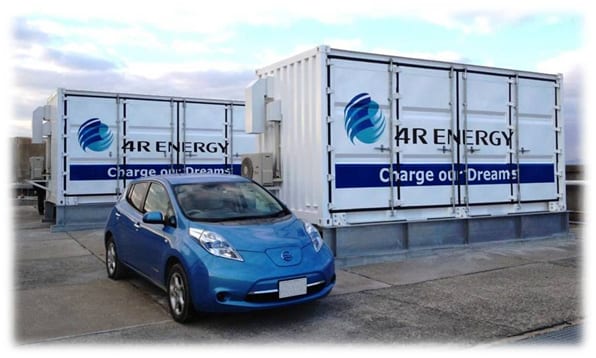The world’s first large-scale solar power storage system to incorporate used batteries from electric vehicles has been built in Japan.
The commercial-scale energy storage system has been developed and deployed at a 10MW solar farm in south western Japan, having been selected by Japan’s Ministry of Environment as a ‘model project’ to test the use of battery storage in conjunction with renewable energy.
The Hikari-no-Mori (‘Forest of Light’) solar farm was built by Sumitomo Corporation and six associate companies, when their mega-solar proposal won the city of Osaka’s 2010 public tender for ideas on a new use for a landfill site located on Yume-Shima Island, Osaka.
Sumitomo then created a joint venture company with Nissan Motors – 4R Energy Corporation – to investigate the re-purposing of used EV batteries. This led to the development and installation of a 600kw/400kWh prototype system, using sixteen used lithium-ion batteries from Nissan’s Leaf model EV.
The idea that the used battery from a hybrid or electrical car can be re-used for such purposes as the storage of renewable energy is an exciting one for the industry, with the potential to lower one of the biggest hurdles to energy storage proliferation – that of cost.
Battery makers such as BYD have pondered the deployment of used EV batteries in home storage applications, a development they say could reduce the cost of storage substantially.
In the Netherlands, grid operator Liander is working with the University of Applied Sciences of Arnhem & Nijmegen and the University of Technology in Eindhoven, to test the possibilities of giving batteries from hybrid or fully electrically-powered cars a second life, using two expertly dismantled Volkswagen Golfs.
“Once the operating radius has fallen by 20-30 per cent, batteries for … (EV use) are disposed of,” said Jos Blom, Innovation and Strategy Consultant at Liander. But for other (stationary) applications, he adds, there may be untapped potential.
These applications, says Blom, could include household energy storage, as well as backup for a diesel generator in combination with solar PV in remote and rural ares. But for grid operators like Liander, he says, “it is important that we already start investigating such possibilities with a view to changes in customer demand.”
In Japan, the Osaka solar storage system – which is due to begin operating this month – will be trialled for three years to test the suitability of the batteries to smooth fluctuating output from the 10MW solar farm, Sumitomo said in a statement. It will also test the suitability of used EV batteries for large-scale storage applications.
“We are pleased to be a part of such an important verification project that can both utilize used EV batteries, and provide a large-scale power storage facility, which are important issues that need to be addressed for the future of renewable energy,” said battery business development department General Manager, Norihiko Nonaka.










